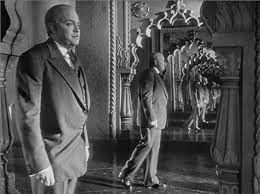
What is there left to say about Citizen Kane?
It’s got to be one of the most written about movies of all time. Whether in books about Kane itself or biographies of Welles, of which there are a bunch, or the biographies of others who figured in its making—a remarkable array of talent in all film-related fields—the movie and its making have been remembered, chronicled, appraised, analyzed, lauded, slammed, poked, inflated (“the best Hollywood movie ever made!,” which I believe has done more to make the movie inaccessible than any negative comment ever could, because it invites people to say, O come on). There are movies about its making, most recently last year’s Mank.
Orson Welles died in 1985, and even though he was laid to rest 36 years ago, he still provokes intensely passionate responses, positive and negative. I’ve ended conversations before things got ugly with friends who hate the guy’s guts, and I’m talking about movie people I really respect, who are aghast because I don’t share their hatred for the guy.
His movie debut, 80 years old this year, is as polarizing as he is. It has been since before its premiere in May, 1941, which almost didn’t happen at all—wouldn’t have happened if William Randolph Hearst had his way. Hearst’s Cosmopolitan Pictures were distributed by MGM, and to placate Hearst, Louis B. Mayer almost had the negative burned (honestly, I’m not sure how that would have worked, since it wasn’t an MGM movie). No Hearst paper would review Kane, and at the time Hearst owned hundreds of newspapers around the country, much like Charles Foster Kane had in his fictional heyday. And Hearst, a media titan who in many ways laid the groundwork for the benighted media landscape we live with today, wasn’t any shyer about using his power to shape events than his [partial] fictional counterpart.
I was 12 years old when I first saw Kane, at a film society screening that had exactly one other viewer. I was a burgeoning old-movie nerd but hadn’t yet heard of Kane, and it dazzled me. I had no idea you could do these things in a movie. It was beautiful and exciting and audacious, sometimes very funny. As some of us said back in those days, it really blew my mind.
And in decades since, I have seen it many, many times. Now, tbf, I watch lots of movies over and over, but Kane is among those that always reward another look. Forty-one years after that first exposure, Kane still reveals something new every time I watch it.
So while this blogathon is dedicated to the extremely worthy subject of Bernard Herrmann’s film music, and participants were asked to review one of the films he scored, I’m not going to review Kane for you. If you know it and love it you don’t need my two cents’ worth; if you’ve watched it and found it boring or old-fashioned, you won’t be persuaded by my deep love and continuing fascination with it; and if you haven’t seen it, or even heard of it (hard to believe), I just can’t write the 1,000th plot synopsis and repeat the usual tropes about Hearst and Marion Davies, or whether Welles or Mankiewicz was the one responsible for its brilliant screenplay (fwiw, Robert Carringer analyzed all existing drafts of the script decades ago and concluded that while Mankiewicz’s doorstop-sized first draft was essential to what the final script became, it was Welles who shaped the material into what we see in the movie). Or how Hollywood hated Welles before he started preproduction, before he even got to Hollywood, because he was a mouthy brat who had no reverence for the film industry, who at 24 had set the theater world on fire with his inventive stagings of new and classic plays, perhaps best remembered now for his “Voodoo Macbeth,” funded by the WPA and staged in Harlem with an all-black cast—one of the top stops on my time-travel wish list.
There are going to be spoilers, so be forewarned: If you don’t know the basics, you will after reading this, because there’s just no way to write about Herrmann’s score without talking about them. But if you do decide to go ahead, be of good cheer: perhaps the world’s greatest MacGuffin is Rosebud, Kane’s childhood sled. Rosebud makes a lot of people think, Duh, how obvious, which helps them dismiss the movie, because they understandably think “If that’s the answer, what’s all the fuss about?” But it’s easy to miss the forest for the trees, you might say, because while Rosebud is a poignant reminder of a childhood lost, of the joy of play and the security of knowing your mom is inside the house nearby and all’s well enough with the world, it no more shows us who Kane really is than his vast collection of art, much of it still sitting in the crates it was shipped in.
Citizen Kane is as much about what can’t be known, about the mystery of identity, as it is about the danged sled. I mean, Rosebud is a powerful metaphor, and we’re still talking about it 80 years later, so that’s some serious juju. But there are other unknowns that will always tantalize me.
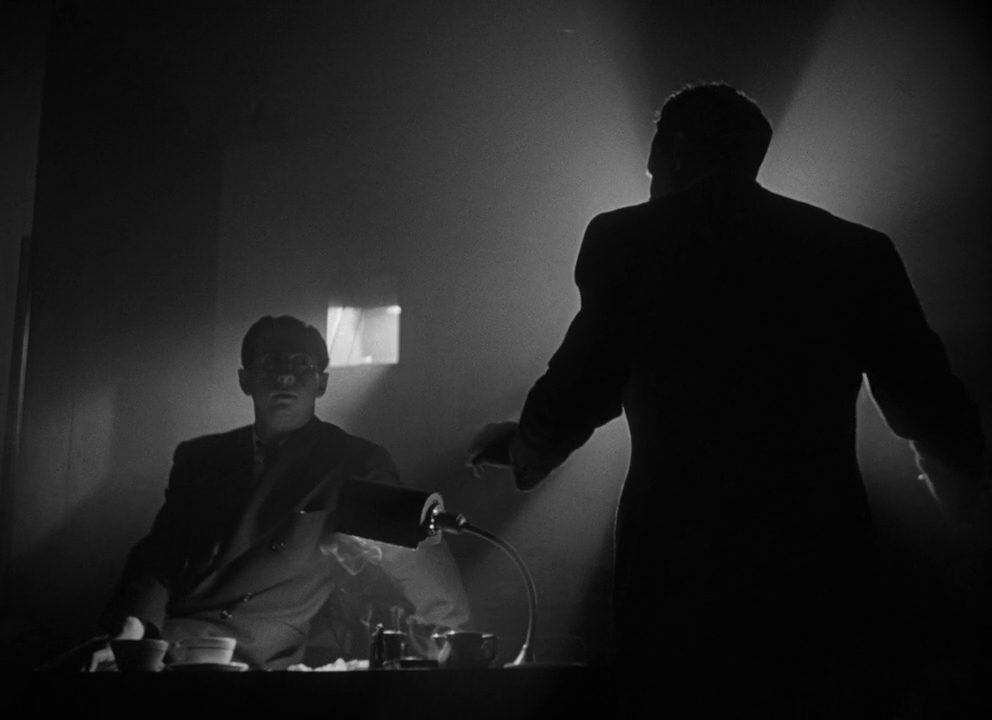
Kane is a grand, gloomy shaggy dog story about a newsreel reporter assigned to find out the meaning of Kane’s dying word (again, Rosebud). He interviews several of Kane’s long-term associates, personal and professional, and peruses the memoir of his late banker/guardian, sometimes getting alternate versions of the same events, as one does. In the end he has gotten an earful, but he knows he’s just been playing with the pieces of a jigsaw puzzle, and he’s convinced that none of what he’s learned solves the riddle of Charles Foster Kane. As the reporter and his colleagues get ready to leave Kane’s Xanadu—a parody of Coleridge’s “stately pleasure palace,” a temple to vanity and a fortress against the judgment of the world and those who want to get too close, the movie shows the movie audience what the reporter couldn’t find: among the vast pile of *stuff*, some of which, being unsaleable, is being burned, is Rosebud. But if you watch the movie enough times, eventually you twig to the truth that while Rosebud is vitally important—a potent image and word to summon all of life’s losses—in the end, it’s just another piece in the puzzle, not the one-word answer to the unsolvable question of what defines a human being.
There’s been much talk about Kane being Hearst, but also speculation about the parallels of Kane’s life and character to Welles’s, sometimes going so far as to suggest that the movie is sleight-of-hand autobiography for its director. I can’t speak to that, but there is one parallel that increasingly strikes me, and that is that Welles’s adoring mother died of hepatitis just after his 9th birthday, and Kane’s mother sends him away when he is about the same age.
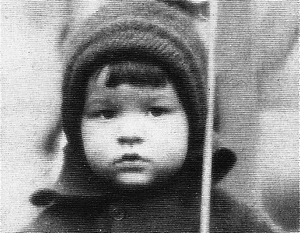
Baby Orson
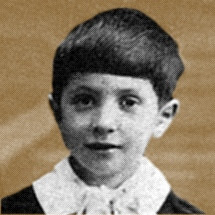
Herrmann
Welles went to live with Richard, his alcoholic father (Orson’s parents were already divorced). Welles and his dad traveled extensively together before settling down for a while in a country hotel his father owned. When the inn burned down, they went back to traveling until Welles told his father he didn’t want to see him because of his drinking. Not long after that, when Welles was 15, his father passed away alone in a Chicago hotel, leaving Welles feeling guilty that he had possibly contributed to his father’s despair and death. He returned to the Todd Seminary for Boys, an expensive prep school where he spent several years, in Woodstock, Illinois, and chose for his guardian his parents’ friend Maurice Bernstein, a doctor who practiced in Chicago, whom Welles called Dada Bernstein (Welles named Kane’s financial manager Bernstein in tribute). Kane’s mother sends him East with his banker guardian, Thatcher, the man she has chosen to prepare her child for the life he will be thrust into as one of the world’s richest men.
Later in the movie we learn that Kane’s mother died “a long time ago,” but that’s all we learn, so we don’t know if he ever got to see her after she packed him up and abruptly put him on that train in the night, riding through the darkness away from everything he knew, most painfully his mother. We don’t know because Kane only mentions her a couple of times, in passing. We see in his face when Thatcher presents him with a much fancier sled than Rosebud—abandoned in the falling snow when he was wrenched from his parents—that he is consumed by anger, and who wouldn’t be? But he never speaks of it, or of anything inside. He seems to have dealt with his traumatic loss by walling it off, adopting a lighthearted, careless persona, the bad boy expelled from school after school, who never quite grows up.
Okay, so I am telling you stuff about the movie, after all. But that’s enough of that. Now let’s talk about Bernard Herrmann, who like Welles made his film debut with Kane, and who despite huge differences in their early lives had a few other notable things in common with his director. Both dazzled with their brilliance, intellectually and artistically. Both were prodigies, with Welles’ theater and radio work more widely known, but Herrmann started his own orchestra in New York when he was only 18 years old, and he became a composer and conductor at CBS not long after. While Welles was becoming a celebrity known to many who would never see a Broadway show via his radio work, Herrmann was hobnobbing with the greatest musical talents in New York, studying with some of them and cultivating friendships with others such as Aaron Copland and George Gershwin.
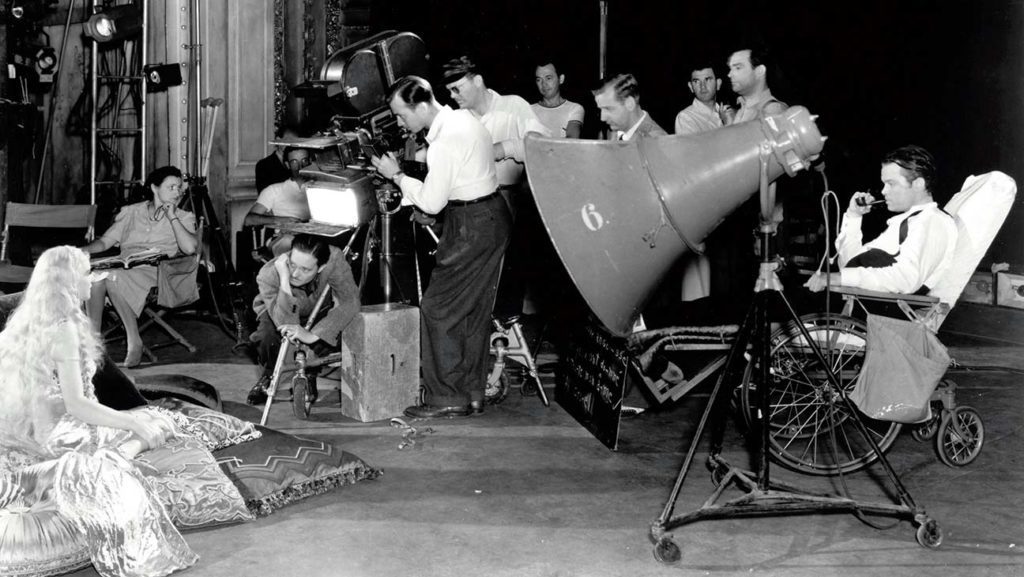
Citizen Kane (1941)
Directed by Orson Welles
Shown on the set, far left: Dorothy Comingore; squatting under camera: cinematographer Greg Toland far right in wheelchair: Orson Welles (as Charles Foster Kane)
The two came together professionally at CBS, where Herrmann scored some of Welles’s radio shows. Radio work was technically exacting: the real and trumped-up accusations against Welles as a movie director—saying he was irresponsible with budgets and schedules—are faults simply not possible in a medium with fixed-length programs. They had 15 minutes, maybe 30 minutes or an hour, but there was no wiggle room, and the ad breaks had to come off as they had been sold or there would be hell to pay with the sponsor. They learned to work quickly, to make decisions about what to cut or add, how to tell a story with the greatest economy. All these skills would come west with Herrmann and Welles, and inform their film work.
Both had superhuman self-confidence, and were by nature outsiders who didn’t care about Hollywood’s displays of wealth and status. Welles’s deal with RKO, though, was famously unprecedented in the freedom it legally bestowed on him. He knew he would never again have such power, such artistic latitude, in a Hollywood studio. Herrmann’s latitude was less sweeping, but he was very particular about his work and how it was arranged and recorded. He said that orchestration was like the composer’s thumb print, and that he couldn’t understand how any composer could allow his work to be arranged by anyone else. He was famous for starting with a new orchestra on a very bad foot, as the cantankerous composer made his musical demands of musicians who didn’t yet know how he worked. But usually before the end of that first day, all would be resolved as the orchestra observed his professionalism, his clarity about what he wanted down to the smallest detail.
They had enormous respect for each other artistically and affection for each other personally, though both could exasperate a saint.
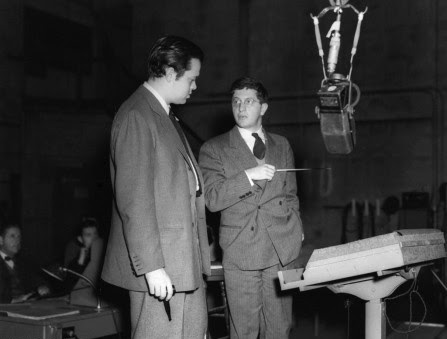
Kane gets lots of ink for its innovative visual style and fractured narrative. But thanks to Herrmann, its score is equally innovative, and like Welles in his directorial debut, Herrmann brought big changes to film scoring that have been enormously influential on composers such as John Williams, Danny Elfman, Lalo Schifrin, Elmer Bernstein, Carter Burwell, and many others.
During the 1930s, studio music departments were stuffed with incredible rosters of composing talent, many of whom had trained and worked in prestigious orchestras and opera companies throughout Europe before coming to America. They wrote scores for full orchestras, and many films ran underscoring beneath practically the entire film.
Herrmann studied with some great composition teachers in New York, but instead of focusing his career on conducting, or on writing “longhaired” music, he opted to work in radio, rising quickly at CBS as a composer and conductor. Later, unlike some who toiled in Hollywood, he didn’t look down on popular culture, didn’t consider it beneath him to write for commercial radio shows and films (at least if they met his exacting standards of taste).
Not being wed to using the full orchestra all the time—or even that often—Herrmann was free to put together novel instrumental groupings to create specific tonal effects. Kane’s musical prelude plays over our introduction to Xanadu as a staggering folly, a haunted palace looming on a manmade mountain in south Florida, decaying yet unfinished sprawl, a man’s monument to himself and his withdrawal from a world he can no longer tolerate, is scored for 4 flutes, 4 alto flutes, 4 bass flutes, contrabass clarinets, tubas, trombones, low-register percussion and vibraphone. He could create exactly the palate of musical sonorities he needed to express any mood or emotional state.
In one set of cues, for the famous breakfast scene daisy chain that charts the disintegration of Kane’s first marriage, each of the five scenes has a distinct musical cue, reflecting the painful shift from the delicate waltz that captures the romantic glow at the marriage’s start through cues of increasing discord and tension, none longer than 1:23—a 16-year marriage played out in maybe five minutes.
This radical move away from the established musical style and orchestration was of course fine with Welles, and it gave Herrmann vast possibilities to musically comment on specific moments in the story and the particular feelings of any character.
And it is this that seems one of Herrmann’s greatest contributions to the art of film music. If, like me, you are attuned to soundtracks when you’re watching a movie, you have probably noticed that in mediocre scoring (and for that matter, mediocre movies), music is used like a blinking APPLAUSE sign in a TV studio: to cue the audience on what we’re supposed to feel in response to what’s happening onscreen. It’s like watching a movie for the first time with someone who already knows it well, and having them tell you before a big plot point, or that a great joke is coming up so you’d best prepare to laugh.
Such scores function to fill in what the story and dialogue aren’t doing well enough on their own—they make sure we don’t misread the dramatic or comedic intent of a line or scene. They are external to the characters, almost a Greek chorus underlining how the filmmakers want us to respond.
But Herrmann is a musical psychologist. He doesn’t tell us how we’re expected to feel, but what a character is experiencing. The music can be dramatically intense, comical, lighthearted, or any other mood, but Herrmann isn’t looking at us; he’s looking into the minds and souls of the characters.
Take the pivotal scene when Kane’s mother sends him away. The great Agnes Moorehead, whom Welles rated the best in the world, plays Mary Kane indelibly even though she doesn’t say much. When Mary throws open the window and calls out in a voice strangled with pain, “Charles!”—and then says quietly but with great sorrow, still watching her son playing in the falling snow, “I’ve got his bags packed. They’ve been packed for a week,” we see her deep sadness at sending him away but also her unshakeable determination to do this awful thing she believes is so necessary for his future. Herrmann is able to get under characters’ skins and translate their feelings into music with real nuance and understanding. This is a component in all his scores but particularly noticeable in the really dark ones, like Vertigo, Marnie, and Kane. So rather than being nudged in the ribs and stage whispered “Here comes the funny part!,” we are drawn deeper into the story and the feelings of those who inhabit it.
Because I wasn’t able to take screen shots and video clips to illustrate specific musical cues, I nosed around for some videos you might find interesting if you’re intrigued by Herrmann and want to hear more about him, as well as some of his music. I found very few interviews with the maestro, but got this one from the early ‘70s, a few years before his death, where he talks about meeting the Beatles in their early days when he was conducting in Liverpool. He would have been 50ish at the time, and his musical orientation had never betrayed much interest in jazz or popular music, but he instantly understood the Beatles’ music—even this early in their development—and tried to help them get signed to a label, or so he said. Point is, Herrmann never closed his ears or his mind, musically speaking. He remained sensitive to fresh energies and sounds. His final film score, for Taxi Driver (1976), inaugurated a new-for-him jazz-inflected sound, and he surely would have continued to grow and experiment had he been given the time.

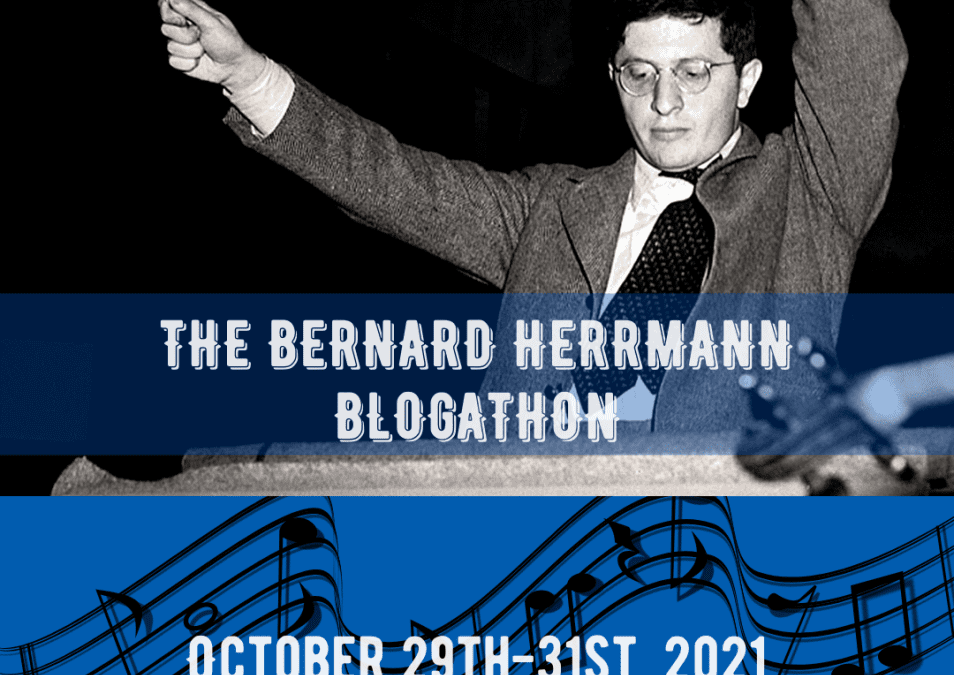

Fascinating, thoughtful, and enlightening article. I shall be returning to it as I return to Kane.
Thanks, Doll, looking forward to reading yours!
Excellent essay! BTW, I’ve always found it strange that Herrmann won the Oscar for The Devil and Daniel Webster, and not for Welles’s movie.
Same here. Could it be the Academy’s antipathy to Kane?
Otoh, in 1958 Burl Ives won Best Supporting for The Big Country rather than Cat on a Hot Tin Roof—so they have to make these kinds of calls sometimes. But it does seem either arbitrary or yet more hostility to Kane.
I must confess, I’m one of those who watched Citizen Kane and thought, “WHAT is the big deal?” (Of course, I already knew what Rosebud was and watched it on the smallest of small screens – neither of which helped my viewing experience, I’m sure.) But your thoughtful insights helped me to understand it better. The background on Welles was particularly interesting. (And I love the childhood pics of him and Bernard Hermann!) I may revisit Kane, now that I know more about Hermann (thanks to this blogathon) and a greater appreciation for the film itself (thanks to you).
I’m glad I participated in this blogathon (my very first, actually!), as it’s introduced me not only to this brilliant composer whose work is totally new to me, but also to more bloggers along the way. 🙂 I enjoyed reading your post. If you haven’t yet, I’d love for you to check out my entry on Psycho. Thanks! 🙂
PS – I forgot to mention, it’s interesting that you pointed out how Hermann often used select instruments rather than a full orchestra, as I learned when preparing my post that he used only strings in Psycho. (I don’t think I’ve ever heard of another composer doing that.) Speaking of, what you said about how “Herrmann isn’t looking at us; he’s looking into the minds and souls of the characters” is so brilliant and so true – as I’m not sure there’s ever been a more “mentally disturbed” piece of music than Psycho’s main theme!